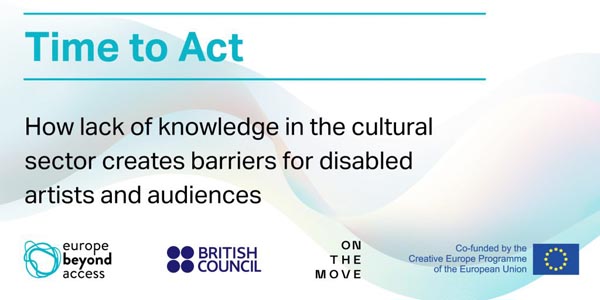Initial findings from research undertaken in the European Union, as well as Switzerland and the UK, open a window on accessibility and the arts in 40 countries.
 Like New Zealand, the EU and all its member states have ratified the UN’s Convention on the Rights of Persons with Disabilities. This Convention recognises disabled people’s right to take part on an equal basis in cultural life and its members’ duties in ensuring this.
Like New Zealand, the EU and all its member states have ratified the UN’s Convention on the Rights of Persons with Disabilities. This Convention recognises disabled people’s right to take part on an equal basis in cultural life and its members’ duties in ensuring this.
The EU’s research project examines the level of knowledge and experience among Europe’s cultural organisations about disabled artists and their work. It also looks at what knowledge there is around ways to make performing arts programmes accessible to disabled artists and disabled audiences.
Acknowledging the impact of the COVID-19 pandemic and the way the research was conducted online, the preliminary report Time to Act (March 2021) aims to provoke ongoing discussion, feedback and advocacy.
Time to Act was authored by On the Move, the cultural mobility information network, and commissioned by the British Council and Europe Beyond Access.
Some preliminary findings
Here are a few findings:
- 52% of performing arts professionals rated their knowledge of work by disabled artists as either poor or very poor (16.1% rated it good or excellent)
- 87% of venues and festivals don’t involve disabled people in selection panels or in the commissioning process
- 87% of venues and festivals don’t provide accessible marketing materials
- 88% of venues and festivals don’t offer an accessible booking process
- 81 % of venues and festivals don’t have an accessible website.
Wrapped around these statistics is a discussion about what they mean and possible solutions. You can also watch a recording of a webinar discussing the findings and the barriers that disabled people experience in accessing the arts.
Be. Lab disability participation statistics
Back in New Zealand, Be. Lab has told us that 52% of disabled New Zealanders aren’t able to participate in a public activities and events such as those at museums, galleries and theatres because of inaccessibility issues.
In previous blogs, I have often talked about the importance of research to support our work and to make a business case for funding. Angela Yeoman, our Policy Principal, has been working on several research and policy projects.
Building on Manatū Taonga Ministry for Culture and Heritage’s 2018 research, Angela conducted further research in 2020 to provide evidence on the value of creative spaces.
All of this research supported the business case for more sustainable and consistent funding for creative spaces, and contributed to Minister Sepuloni’s announcement in March 2021 of the Creative Spaces Initiative. This is an $18 million fund targeted at creative spaces and spread over three years and Arts Access Aotearoa is very pleased to support the Ministry for Culture and Heritage as advisors on the application process.
Researching benefits of the arts in prisons and youth justice facilities
Angela is currently researching the benefits of arts programmes in prisons and youth justice facilities, looking at 40 years of evaluations overseas. All the studies reviewed so far provide evidence of significant benefits from art programmes.
The benefits for adults serving sentences and youth in care and protection facilities include improved relationships and behaviours, increased confidence and skills, reduced depression and anxiety, and an increased sense of competence and self-belief. In the longer term, these outcomes lead to a readiness to take on training, education and therapeutic programmes; find employment; and desist from re-offending.
Many studies also show a social return on investment of between $4 and $11 saved for every dollar invested in such arts programmes, representing a saving of taxpayer funds.
Funding for Deaf and disabled artists
The third area Angela is investigating is Deaf and disabled artists. This includes an overview of arts councils in Australia, Canada and Ireland, and how we might improve ways of working with Deaf and disabled artists and their communities in Aotearoa.
Recently, Angela also worked with Stace Robertson, our Access, Inclusion and Participation Advisor, to write How to develop and write an accessibility policy for arts and cultural organisations. You can read it on the Arts Access Aotearoa website and watch a Zoom presentation.
There has been some great feedback about the guide, include this from Alexis Holmes at Creative Waikato: “I have sent it on to our CEO. This is incredible work and will be invaluable so thank you and the team for this.”


